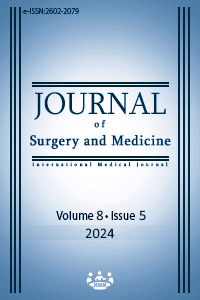Paraneoplastic opsoclonus-myoclonus syndrome as a rare presentation of parotid adenocarcinoma
POMA syndrome with parotid adenocarcinoma
Keywords:
opsoclonus, myoclonus, parotid, adenocarcinoma, paraneoplasticAbstract
Paraneoplastic Opsoclonus-Myoclonus Ataxia Syndrome (POMA) is a rare neurological condition that affects approximately 1 in 10,000,000 people annually. This syndrome is poorly understood and can lead to long-term cognitive, behavioral, and motor complications. Opsoclonus is characterized by involuntary, rapid, repetitive, multi-vectorial oscillations of the eyes occurring in all directions of gaze. It is accompanied by diffuse or focal body myoclonus and may or may not include ataxia and other cerebellar signs. POMA is typically a paraneoplastic syndrome associated with neuroblastoma in childhood and breast carcinoma or small-cell lung carcinoma in adults. Additionally, viral or toxic agents are known to play a role in its etiology, and the immune system is involved in the pathogenesis. We report a case of a 41-year-old man with anti-Ri antibody opsoclonus-myoclonus syndrome and parotid adenocarcinoma involvement. After diagnosing opsoclonus-myoclonus syndrome, the patient underwent multimodal immunotherapy treatment, resulting in partial remission of the neurological symptoms.
Downloads
References
Darnell RB, Posner JB. Paraneoplastic syndromes involving the nervous system. N Engl J Med. 2003 Oct 16;349(16):1543-54. doi: 10.1056/NEJMra023009. PMID: 14561798. DOI: https://doi.org/10.1056/NEJMra023009
Luque FA, Furneaux HM, Ferziger R, Rosenblum MK, Wray SH, Schold SC Jr, et al. Anti-Ri: an antibody associated with paraneoplastic opsoclonus and breast cancer. Ann Neurol. 1991 Mar;29(3):241-51. doi: 10.1002/ana.410290303. PMID: 2042940. DOI: https://doi.org/10.1002/ana.410290303
Erlich R, Morrison C, Kim B, Gilbert MR, Alrajab S. ANNA-2: an antibody associated with paraneoplastic opsoclonus in a patient with large-cell carcinoma of the lung with neuroendocrine features--correlation of clinical improvement with tumor response. Cancer Invest. 2004;22(2):257-61. doi: 10.1081/cnv-120030214. PMID: 15199608. DOI: https://doi.org/10.1081/CNV-120030214
Kumar A, Lajara-Nanson WA, Neilson RW Jr. Paraneoplastic Opsoclonus-Myoclonus Syndrome: initial presentation of non-Hodgkins lymphoma. J Neurooncol. 2005 May;73(1):43-5. doi: 10.1007/s11060-004-2465-9. PMID: 15933816. DOI: https://doi.org/10.1007/s11060-004-2465-9
Musunuru K, Kesari S. Paraneoplastic opsoclonus-myoclonus ataxia associated with non-small-cell lung carcinoma. J Neurooncol. 2008 Nov;90(2):213-6. doi: 10.1007/s11060-008-9650-1. Epub 2008 Jul 11. PMID: 18618225; PMCID: PMC2652648. DOI: https://doi.org/10.1007/s11060-008-9650-1
Aquilina A, Dingli N, Aquilina J. Postintervention acute opsoclonus myoclonus syndrome. BMJ Case Rep. 2017 Apr 21;2017:bcr2017219859. doi: 10.1136/bcr-2017-219859. PMID: 28432174; PMCID: PMC5534871. DOI: https://doi.org/10.1136/bcr-2017-219859
Martins L, Galvão D, Silva A, Vieira B, Reis Ó, Vitorino R, et al. Paraneoplastic opsoclonus-myoclonus syndrome as a rare presentation of breast cancer. J Surg Case Rep. 2019 Feb 8;2019(2):rjy365. doi: 10.1093/jscr/rjy365. PMID: 30788093; PMCID: PMC6368204. DOI: https://doi.org/10.1093/jscr/rjy365
Scarff JR, Iftikhar B, Tatugade A, Choi J, Lippmann S. Opsoclonus myoclonus. Innov Clin Neurosci. 2011 Dec;8(12):29-31. PMID: 22247816; PMCID: PMC3257986.
Downloads
- 999 631
Published
Issue
Section
How to Cite
License
Copyright (c) 2024 Buket Özkara Yılmaz
This work is licensed under a Creative Commons Attribution-NonCommercial-NoDerivatives 4.0 International License.
















